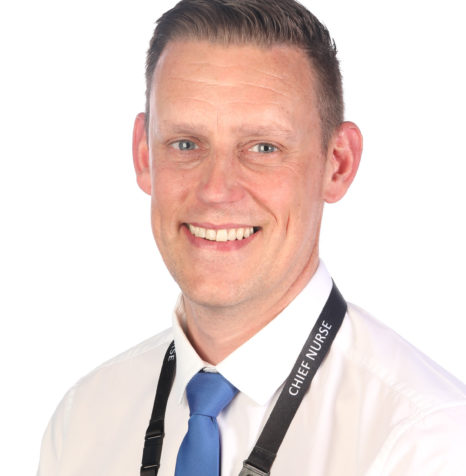From bystanders to activists

Dr Giles Thorpe is the Chief Nurse and Director of Infection Prevention and Control for East Suffolk and North Essex NHS Foundation Trust.
Giles Thorpe clearly remembers the moment he realised the corrosive impact racism was having on his colleagues. He heard a story about a locum consultant who had stepped into the breach at the height of the pandemic, done fantastic work but had now decided to leave the organisation. When asked why, the consultant said that they had worked all over the country but had never experienced such overt racism from patients before. “It was horrendous to hear that,” Giles recalls. “It stopped me in my tracks.”
Since that moment Giles, who is Chief Nurse and Director of Infection Prevention and Control at East Suffolk and North Essex NHS Foundation Trust, has made it his mission to display and champion allyship for his colleagues of colour. As a gay man he – sadly – understands the scourge of homophobia but acknowledges that he cannot even begin to understand what it is like being abused for the colour of your skin. “I had to question my own assumptions,” he adds. “Was I living inside a white bubble?”
He started asking his colleagues about their experiences, finding that some didn’t even feel comfortable sharing their negative experiences with him as a senior white male leader. As a leader who strives to create environments where people feel safe, supported, and able to ask questions and fail safely, this really hit home for Giles. “It made me think: How am I perceived? How do I come across?” he says.
Going on the ‘NHS Getting to Equity Programme’ opened his eyes even more. One message that really stuck with him from the programme was thinking of race as being “at the bottom of the totem pole of protected characteristics”. “If we do something positive to address racism, then all the other protected characteristics will benefit,” he says. The programme kick-started his journey to being a more effective ally: a message he is now passionately sharing far and wide.
“For me, allyship isn’t about sitting there saying ‘oh isn’t that awful,” he explains. “It’s about actually doing something about it. It’s recognising white privilege, being able to enter a space with openness, humility, and curiosity to see how I can support people from ethnic minority groups to feel safe, to raise their concerns and to be their true selves. It’s about listening, hearing, understanding, and asking the question: What can I do? We have to actively call out racism wherever we see it, whether that be individual or institutional.”
Sponsorship is also important, given the lack of minority ethnic representation in senior leadership positions within the NHS. Of the most senior roles in the NHS (graduate entry grades), almost 93% are occupied by white people. “How do we, in senior leadership roles, create that sense of sponsorship for people from ethnic minority backgrounds to achieve their potential?” asks Giles. In his career, he reflects how much he has benefitted from having mentors and coaches who have helped him look at things through different lenses and reflected how he could improve in his own leadership style. Everyone, whatever their background, should have similar opportunities for development.
Within his organisation, Giles is currently working with his senior nursing workforce on a mission statement that sets out a zero tolerance approach, for staff and patients, when it comes to racism. But it will also cover areas like cultural sensitivity.
“We have nurses coming to us from all over the world and historically the approach would be: ‘Welcome to the UK; you need to adapt.’” Giles explains. “Now my cultural competence has increased. We have some midwives coming over from Zimbabwe, and we have found someone originally from Zimbabwe who will work with them around what it means to live in the UK and what they need – around their faith, for instance. It’s more about making sure we are supportive, embracing them as people, and celebrating their ethnicity, their diversity and their background. How do we need to change to support them so they can be their true selves while they’re working for us?”
Being a true ally requires confronting uncomfortable truths. The first, Giles believes, is to recognise that some part of many of us is likely to be racist. “That’s quite a controversial thing to say,” he acknowledges, “but racism is socially constructed and we have grown up within that construct. Ask yourself: apart from in a work environment, how many people from ethnic minorities do you socialise with? Once you accept that some part of you might be racist, you may then need to accept your white privilege. It’s important to challenge yourself as a leader to truly understand this. That will allow you to enter the conversation with humility.”
When it comes to challenging racist behaviour from others, he advises citing the NHS Constitution, which states that people will be provided healthcare whatever their protected characteristics. “If you work in the NHS, it is your responsibility as an employee, as a member of this community, to uphold the tenets of the NHS Constitution,” Giles says. “I think it is perfectly acceptable to go to somebody politely and professionally and to say ‘this is not an accepted standard of behaviour’. Raising this as an uncomfortable conversation with others means we get that social movement of people starting to question things. Don’t be a sad bystander. Be an active participant.”